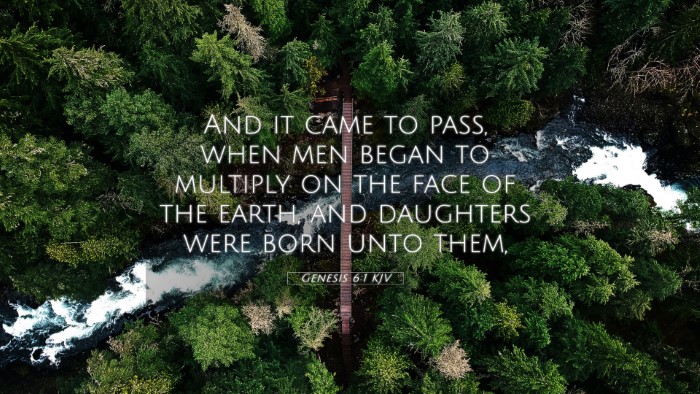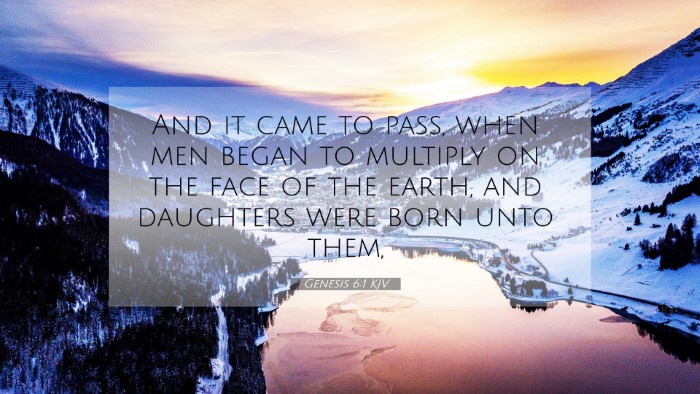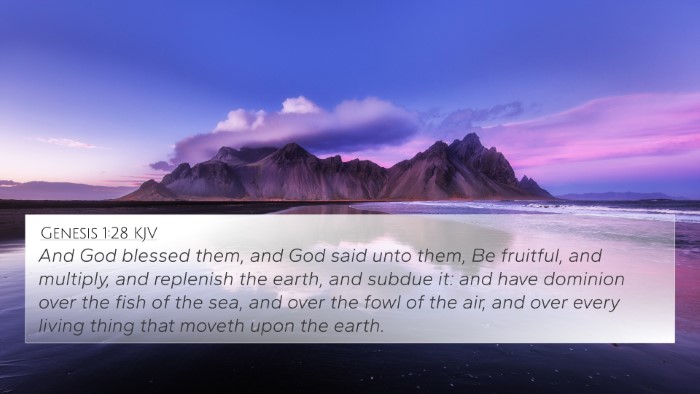Understanding Genesis 6:1
Genesis 6:1 states: "And it came to pass, when men began to multiply on the face of the earth, and daughters were born unto them." This verse serves as an introduction to a narrative that will detail the state of humanity before the flood.
Contextual Overview
As we analyze this verse, it is essential to recognize its placement within the broader context of Genesis. In the early chapters, we see creation, the fall, and the beginnings of human civilization. With the multiplication of people on earth, a significant theme emerges regarding the relationship between humanity and divine will.
Commentary Insights
-
Matthew Henry points out the implications of human multiplication, attributing both positive growth and a potential for increased sinfulness. He emphasizes that as humanity flourished, their spiritual state began to decline, suggesting a correlation between population growth and moral decay.
-
Albert Barnes highlights the phrase "when men began to multiply," suggesting a pivotal moment in human history. He discusses the subsequent societal changes and the moral and spiritual implications of this growth, indicating that with more people, there are more opportunities for sin and corruption.
-
Adam Clarke elaborates that this verse not only marks the growth of the population but also signals a transition into a period of heightened wickedness. Clarke elaborates on the historical context, noting the societal dimensions of family formation and how they reflect upon divine judgment.
Thematic Bible Verse Connections
This passage can be cross-referenced with several other verses to deepen the understanding of its implications:
- Matthew 24:37-39 - "But as the days of Noah were, so shall also the coming of the Son of man be."
- Genesis 1:28 - "And God blessed them, and God said unto them, Be fruitful, and multiply, and replenish the earth."
- Genesis 5:29 - Referring to Noah's birth, which signifies hope during a time of corruption.
- Romans 5:20 - "Moreover the law entered, that the offense might abound. But where sin abounded, grace did much more abound."
- Luke 17:26-27 - A New Testament echo concerning the lifestyles of people before the flood.
- 2 Peter 2:5 - "And spared not the old world, but saved Noah the eighth person, a preacher of righteousness, bringing in the flood upon the world of the ungodly;"
- Ecclesiastes 7:20 - "For there is not a just man upon earth, that doeth good, and sinneth not."
Significance of Cross-Referencing Biblical Texts
Understanding Genesis 6:1 through cross-referencing provides crucial insights into the human condition and divine perspective. The connections illustrate a biblical narrative where population growth leads to moral challenges, reinforcing the importance of righteousness.
Tools for Bible Cross-Referencing
Utilizing tools for bible cross-referencing enhances study and comprehension. This includes:
- Bible concordance
- Bible cross-reference guide
- Cross-reference Bible study resources
- Bible chain references
How to Effectively Cross-Reference
To find connections effectively, consider the following:
- Identify themes in the context of your study.
- Utilize a comprehensive Bible cross-reference system.
- Engage with inter-Biblical dialogue through thematic analysis.
- Compare verses within the Old and New Testaments for deeper insights.
Conclusion
Genesis 6:1 serves as a pivotal verse that sets the stage for understanding humanity's descent into corruption. By incorporating cross-referenced biblical texts and insights from prominent commentaries, we can appreciate the depth of this narrative and its implications for understanding the broader themes of sin, judgment, and divine grace in Scripture.



